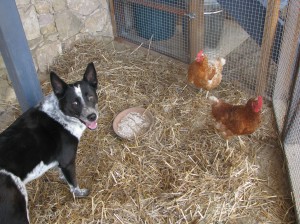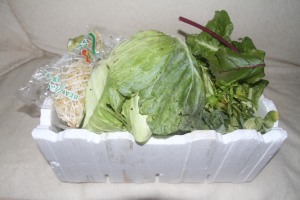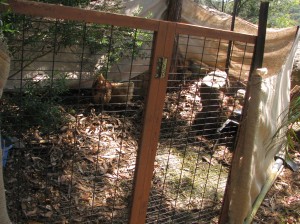
One of the key functions of our small flock is to provide us with eggs for food. Just like our fruit and vegetables, it’s a very good feeling knowing exactly where our produce has come from, how it’s been grown and how those plants and animals have been looked after throughout the process. Somehow this is very comforting and is one of the very reasons we’ve gone back to a simple way of living.

But looking after chooks, feeding them, tending to their health and cleaning their pen is a commitment and don’t let anyone tell you it isn’t. Owning any animal requires some work and we tend to our chooks every morning as part of a daily routine.
For those of you who might be thinking about getting some chooks, I’ve come up with a list of a few hard and fast rules to think about before you take the leap.
- Don't get chooks (or any pet) unless you genuinely have the time to take care of them. They are entirely in your hands.
- Once you have taken on an animal you are responsible for it for the rest of it's life. Make sure you have a backup plan for when you go away or if you start to wonder what on earth you were thinking. It happens. But unlike an icecream machine, you can’t just shove it in the back of the cupboard and forget about it!
- You must provide the essentials. The absolute minimum is clean water, ample food, adequate shelter and protection from predators. You (and your kids) will be devastated if there’s carnage and with good planning and design this can mostly be prevented.
- You need to have a plan in the event there is an outbreak of disease or you get a sick bird. Check beforehand that your local vet can or will deal with chooks or birds in the event one of them needs immediate attention or even worse, needs to be put down. Of course this is something none of us want to think about but you need to be prepared because there is no excuse for unnecessary suffering. Unfortunately chooks and birds can be sick long before you realise and often by the time you do, it’s already too late.
- Read and learn as much as you can about looking after chickens and how to recognise when there’s a problem.
- You'll need to get a minimum of two chooks. They are social animals and it’s cruel for them to be alone.
- And finally, are you prepared to deal with chook poo on your shoe!

For us the addition of chickens was an easy transition and our animals live like kings. We can't help it, it just happens, just ask our dogs Digger and Shadow. We’ve enjoyed learning how to care for our chooks, getting to know their funny little personalities, working out their hierarchy and for me I’m fascinated in the language of chooks and I think I'm finally onto something. We’ve sorted through some food issues and decided to change their main diet this year to an organic scratch mix which they love. We leave this out for them to range on all day and no, they don’t overeat. Only us humans do that. They also get a variety of vegetable and fruit scraps collected twice weekly from our local green grocer and the odd treat of leftovers or sunflower seeds but these are rationed because they are more like chook chocolate.
On the days we work they spend most of their time in the ‘chook nook’ which is a large fully enclosed pen. The entire front and sides are hard wire which provides protection from our local predators: foxes, quolls, dogs and raptors. The wire also provides good ventilation during our hot summers but also allows the beautiful low winter sun to penetrate deep into their pen during the day. At night as the temperatures started to drop they were quite exposed to the elements so we decided to winter-proof their sleeping quarters for extra warmth and comfort. Kings I tell you!


As chooks have their own downy sleeping bags permanently attached there was no need to go too crazy but a few simple things like adding deeper litter to their roosting areas and nesting boxes and temporarily boarding up the open wire sections to prevent cold air blasting through their perches has made the world of difference, if only to my peace of mind. In the last 4 weeks we've also increased their leafy green intake just enough to keep up with their energy and egg laying needs.
It’s winter in Sydney and we’ve just passed the Winter Solstice so the days are short. Whether it’s just luck or good management I’m not really sure but we smile every day knowing that our hens are happy, are helping us maintain our sustainable cycle and as a bonus are giving us 3 golden eggs a day. I can’t help but think…how lucky are we!
Stay tuned for my next post when I’ll tell you how we went about introducing new chooks to the flock.




